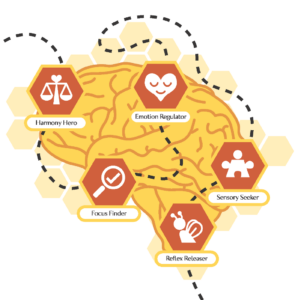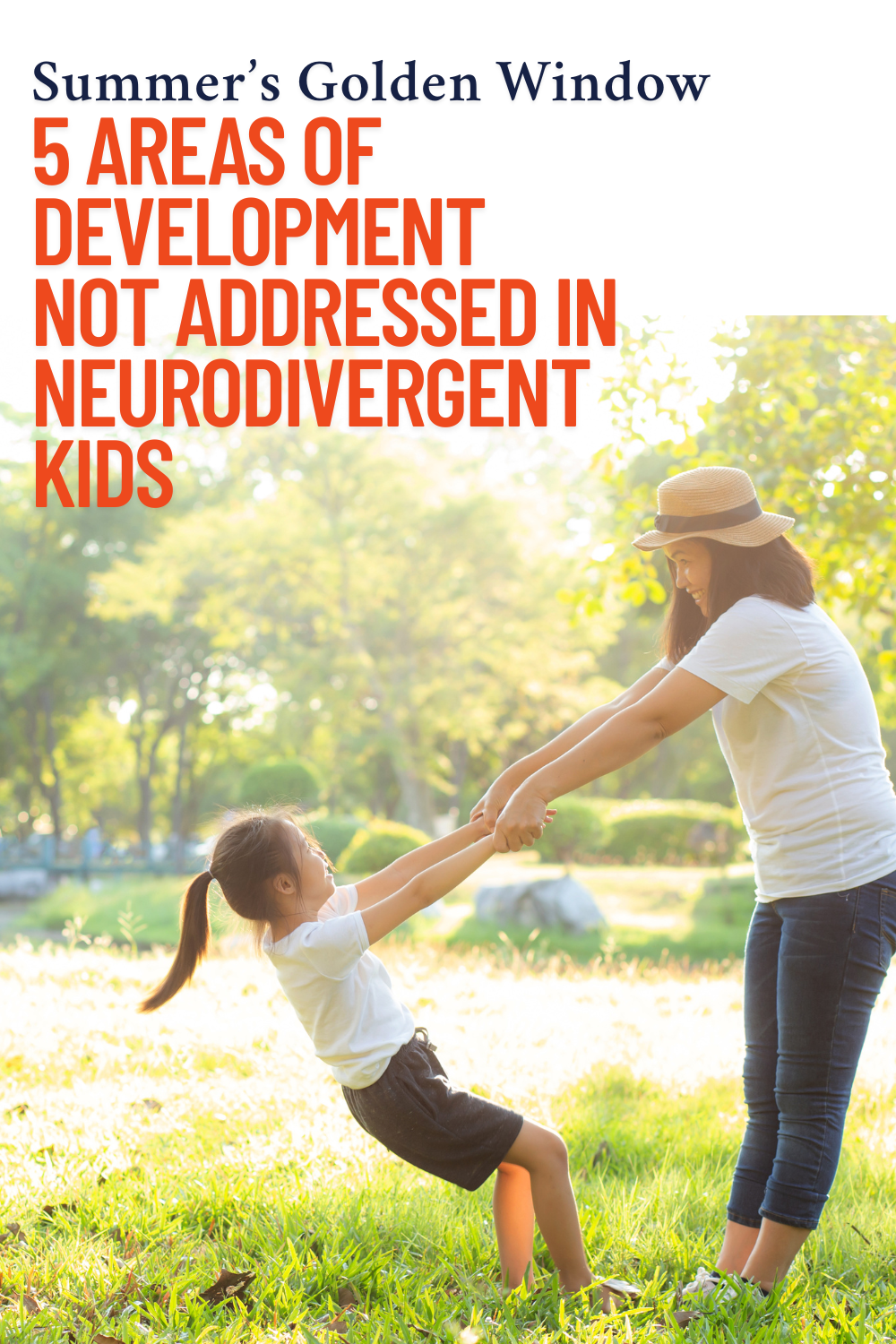My kids have 12 days of school left. And, honestly, I have a mix of emotions…
I’m thinking about how I’m going to manage to juggle my work, but also that it’s one of only a limited amount of glorious childhood summers for my kids.
You know what they say—because it’s true: The days are long but the years are short.
Last summer, I set a goal to work on retained reflexes with two of my kids, taking a break on vacay and finding a way to make it fun (instead of a power struggle).
This summer, I’m leaning in again. One of my kids has some speech articulation difficulties, big emotions, and trouble tracking objects with his eyes.
These all seem like separate issues, but they aren’t.
With the brain it’s all connected!
Other challenges our kids might have (that are all connected) are:
- Needing constant reminders (“Did you brush your teeth?” “Pack your bag?”)
- Bouncing off the wall, non-stop movement
- Emotional meltdowns
- Extreme sensory sensitivities
- Not being able to ride a bike
- Struggles during transitions
- Screen‑time battles by 10 AM
- Feeling disconnected from your kid
When these challenges (and lots of others) are happening on the daily, it’s exhausting—like you’re running on empty.
And, if you don’t know what else to do, it’s so easy to think “this is the way things are.”
Or, “what’s wrong with my kid?”
With school out, you have a golden window to lean in too and start taking one step at a time–even a really small step.
It’s so important that how you lean in makes sense for your life and isn’t overwhelming.
Helping Your Kid MUST Be Do-Able
Sharing key strategies and totally do-able activities is one of my top goals in The Connection Hive, that are all built around… an adaptable step-by-step plan.
So that you’ll start to see:
- Your kid asking for that “movement” because it calms their system—instead of escalating into a full tantrum
- Sitting still for longer periods of time, they’re more regulated, more often
- Being able to shift from playing to meals to a trip to the grocery store without yelling, tantrums, or arguing
- More independence in the everyday activities, with way less reminders!
- You breeze through screen time without a fight.
- Coordination increases and your kid is able to accomplish new things like climbing the jungle gym, riding a bike, or not getting car sick
- Sensory sensitivities lessen, getting dressed isn’t a big deal anymore
- Feeling even more bonded with your kid!
THIS is what is possible.
And, I’m so tired of nobody really talking about it, or showing parents how.
Your kid isn’t bad or weird or difficult.
They are uniquely wired, and you can support them while building new skills that will not only change their lives, but yours too.
Common Challenges for Neurodivergent Kids
Uniquely wired kids with sensory needs, ADHD, or ASD rarely have one “struggle.”
We tend to (or at least I did with my own kid) see my son’s “struggles” as individual silos, to work on, support, and/or move past.
But, in reality, all these struggles are connected even if they seem so different:
- Anxiety
- Picky Eating
- Poor attention
- Sensory Seeking
- Sensory Sensitivities
- Impulsivity
- Big emotions
Now with 21 years as an OT under my belt, I can clearly see specific areas that all neurodivergent kids seem to have challenges in, regardless of diagnosis (or lack thereof).
5 Key Areas of Development Uniquely Wired Kids Need Addressed…
These key areas are what shaped the 5 steps of our Hive growth trail, the foundation of THE CONNECTION HIVE. They are:
Retained primitive reflexes, sensory processing, emotional regulation, executive functioning and deeper connection between parent/child.
This is how development actually unfolds. You’re not just managing behavior—you’re supporting your child’s brain from the ground up.
This is what the Hive Growth Trail looks like: five crystal-clear phases—no guessing, no overwhelm:

However, you can bounce around this trail (not necessarily starting at step 1) based on what your biggest priorities are. Here are the steps of The Hive Growth Trail:
- Reflex Releaser – Spot and soften those stuck reflexes that trip up focus and regulation
- Sensory Seeker – Find your child’s sensory sweet spots (and the red-flag overload moments)
- Emotion Regulator – Build tiny wins around calm-down hacks that actually land
- Focus Finder – Layer in executive-function boosts so your kiddo can start, stick, and succeed
- Harmony Hero – Pull it all together into a daily rhythm that feels balanced, while experiencing a deeper connection between your child
Each of these phases has bite-sized do-able activities, printable visual cards, and simplified guides so you don’t have to wonder how to help your kid regulate. Instead you’ll have a toolbox.
Or, what to do when your kid has explosive emotions, you’ll be ready and even watch these emotional outbursts decrease. Like TCH member Jennifer:
We have been focusing on Moro Reflex for months now because I felt that was the biggest one impacting his emotional regulation. His startle response was on a hair trigger and he got dysregulated very easily by loud noises and stimulus when out. I noticed that he seems more grounded and centered lately, less easily riled up and a few times he was able to go out in the community and took his noise canceling ear phones off without getting over stimulated and had a great time out!
Attention, organization, self-control, and self-awareness can also be strengthened and supported, just like Marci is seeing in her son:
Working on [the activities] as we can and have definitely seen developmental progress ie willingness to interact socially with peers much better than before.
We’re all busy as parents, that’s why everything is 100% doable.
The Right Tolls Can Cause Big Changes
Here’s just a couple of examples of the potential changes you could see after being in The Connection Hive…
| Today | After Using the Phases |
| Mornings that feel like a three‑ring circus | No overwhelm with simple tools that regulate your kid quick |
| “Why won’t they just sit still?” | Almost feels like magic that they’re now sitting for meals and other activities |
| You Googling “quick sensory fix” at 11 PM | A library of strategies you can pull up anytime |
| Feeling like you’re constantly putting out fires | Having a plan that actually prevents the fires |
I’m not just leaning into my own kids this summer, I’m leaning into helping you too. That’s why we’re closing the doors to The Connection Hive in 3 days!
So we can focus on you… I don’t know when the doors will open again.
Join me inside The Connection Hive here!
Let’s make this our best summer yet ♥️
Alisha Grogan is a licensed occupational therapist and founder of Your Kid’s Table. She has over 19 years experience with expertise in sensory processing and feeding development in babies, toddlers, and children. Alisha also has 3 boys of her own at home. Learn more about her here.

8 Secret Strategies for Sensory Issues with Food